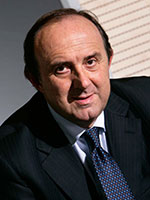Message from the CEO
In an environment where gas demand remained weak, albeit having finally reversed four years of consecutive decline, Snam achieved positive results in 2015, with its various business segments continuing to add value for both the company and its stakeholders.

Adjusted EBIT climbed by 0.9% compared with 2014 to € 2 billion, while adjusted net profit showed greater growth of 12.2% to € 1.2 billion, boosted by better financial management, the contribution from assets acquired as part of the business development strategy and lower taxes following the elimination of the additional corporate income tax (IRES) charge.
By investing over € 1.3 billion, we continued with our programme of upgrading the network and developing new services that are key to our business model. Perhaps most significantly, in December we took another major step in our international growth and development strategy – launched in 2012 to ensure secure and diversified sources of natural gas – by acquiring a 20% stake in Trans Adriatic Pipeline AG (TAP), the Company responsible for the project that will see gas transported from Azerbaijan to Europe.
Following on from the transactions completed in 2013 in France and 2014 in Austria in a bid to gain more influence along the East-West route, the investment in TAP and in Italian pipelines in order to increase northern Europe export potential is part of our strategic plan to transform Italy from a market that not only consumes gas but also transports it, capitalising on our strategic location in the Mediterranean. Our latest acquisition provides not only Snam but also Italy as a whole with a greater role to play and a more importation geopolitical position in Europe’s energy sector.
Snam continues to be respected the world over for the commitment it makes to sustainable development and ethical business practice, and has won major new awards for its efforts. In January 2016, for the second year in a row, RobecoSAM awarded Snam the Silver Class award in its Sustainability Yearbook, an elite classification which recognises the highest-scoring companies with regard to sustainability.
Snam’s stock, which reached a record price of €4.93 on 3 December 2015, is a stable presence, and has been for many years in some cases, on the world’s premier corporate sustainability indices such as the Dow Jones Sustainability World Index, the FTSE4Good, the Climate Disclosure Leadership Index (CDLI) and the various ECPI and Vigeo indices. Snam also confirmed its focus on sustainable growth with active support for the Global Compact, its principles and the Sustainable Development Goals. Snam is one of only four Italian companies in the United Nations Global Compact 100 (GC 100) index, which contains 100 companies that stand out on a global level both for their dedication to sustainability issues and for their financial performance.
All this is the result of the ever-expanding knowledge that Snam has built up over time concerning crucial topics for the business and its stakeholders, and also of how Snam has adopted a structured and uniform approach across the entire Group to gradually integrate these topics into its business development model. Indeed, to highlight the increasing strength of this approach and how it plays a part in our long-term outlook, for the first time our 2015 Annual Report adopts an integrated presentation of financial and extra-financial data and information. Our interpretation was based on recommendations in the International Integrated Reporting Framework and means we already comply with the requirements of the European Directive on this matter, which is expected to take effect by 2017.
Under this scope, the new “Sustainable Paths. Report on Corporate Social Responsibility” implements and further completes the sustainability information to meet the various international guidelines on reporting, with special reference to the GRI-G4 standard. The report focuses on stakeholder dialogue and how it is both a fundamental part of Snam’s business model and relations as well as a way of contributing to social transformation by searching for innovative interpretations of Snam’s role in the growth of the country as a whole.
The CEO
Carlo Malacarne
